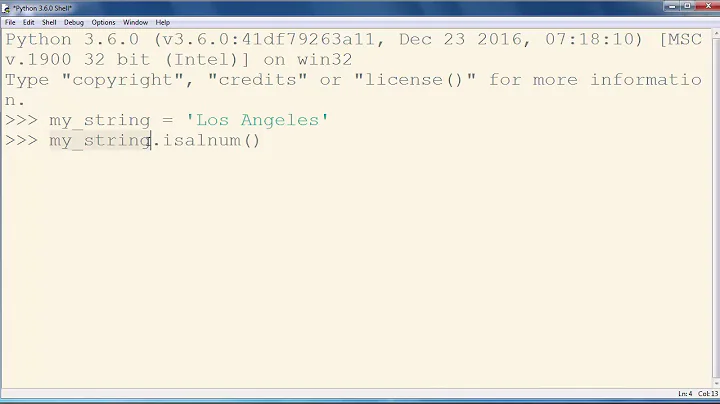In Python, how to check if a string only contains certain characters?
Solution 1
Final(?) edit
Answer, wrapped up in a function, with annotated interactive session:
>>> import re
>>> def special_match(strg, search=re.compile(r'[^a-z0-9.]').search):
... return not bool(search(strg))
...
>>> special_match("")
True
>>> special_match("az09.")
True
>>> special_match("az09.\n")
False
# The above test case is to catch out any attempt to use re.match()
# with a `$` instead of `\Z` -- see point (6) below.
>>> special_match("az09.#")
False
>>> special_match("az09.X")
False
>>>
Note: There is a comparison with using re.match() further down in this answer. Further timings show that match() would win with much longer strings; match() seems to have a much larger overhead than search() when the final answer is True; this is puzzling (perhaps it's the cost of returning a MatchObject instead of None) and may warrant further rummaging.
==== Earlier text ====
The [previously] accepted answer could use a few improvements:
(1) Presentation gives the appearance of being the result of an interactive Python session:
reg=re.compile('^[a-z0-9\.]+$')
>>>reg.match('jsdlfjdsf12324..3432jsdflsdf')
True
but match() doesn't return True
(2) For use with match(), the ^ at the start of the pattern is redundant, and appears to be slightly slower than the same pattern without the ^
(3) Should foster the use of raw string automatically unthinkingly for any re pattern
(4) The backslash in front of the dot/period is redundant
(5) Slower than the OP's code!
prompt>rem OP's version -- NOTE: OP used raw string!
prompt>\python26\python -mtimeit -s"t='jsdlfjdsf12324..3432jsdflsdf';import
re;reg=re.compile(r'[^a-z0-9\.]')" "not bool(reg.search(t))"
1000000 loops, best of 3: 1.43 usec per loop
prompt>rem OP's version w/o backslash
prompt>\python26\python -mtimeit -s"t='jsdlfjdsf12324..3432jsdflsdf';import
re;reg=re.compile(r'[^a-z0-9.]')" "not bool(reg.search(t))"
1000000 loops, best of 3: 1.44 usec per loop
prompt>rem cleaned-up version of accepted answer
prompt>\python26\python -mtimeit -s"t='jsdlfjdsf12324..3432jsdflsdf';import
re;reg=re.compile(r'[a-z0-9.]+\Z')" "bool(reg.match(t))"
100000 loops, best of 3: 2.07 usec per loop
prompt>rem accepted answer
prompt>\python26\python -mtimeit -s"t='jsdlfjdsf12324..3432jsdflsdf';import
re;reg=re.compile('^[a-z0-9\.]+$')" "bool(reg.match(t))"
100000 loops, best of 3: 2.08 usec per loop
(6) Can produce the wrong answer!!
>>> import re
>>> bool(re.compile('^[a-z0-9\.]+$').match('1234\n'))
True # uh-oh
>>> bool(re.compile('^[a-z0-9\.]+\Z').match('1234\n'))
False
Solution 2
Here's a simple, pure-Python implementation. It should be used when performance is not critical (included for future Googlers).
import string
allowed = set(string.ascii_lowercase + string.digits + '.')
def check(test_str):
set(test_str) <= allowed
Regarding performance, iteration will probably be the fastest method. Regexes have to iterate through a state machine, and the set equality solution has to build a temporary set. However, the difference is unlikely to matter much. If performance of this function is very important, write it as a C extension module with a switch statement (which will be compiled to a jump table).
Here's a C implementation, which uses if statements due to space constraints. If you absolutely need the tiny bit of extra speed, write out the switch-case. In my tests, it performs very well (2 seconds vs 9 seconds in benchmarks against the regex).
#define PY_SSIZE_T_CLEAN
#include <Python.h>
static PyObject *check(PyObject *self, PyObject *args)
{
const char *s;
Py_ssize_t count, ii;
char c;
if (0 == PyArg_ParseTuple (args, "s#", &s, &count)) {
return NULL;
}
for (ii = 0; ii < count; ii++) {
c = s[ii];
if ((c < '0' && c != '.') || c > 'z') {
Py_RETURN_FALSE;
}
if (c > '9' && c < 'a') {
Py_RETURN_FALSE;
}
}
Py_RETURN_TRUE;
}
PyDoc_STRVAR (DOC, "Fast stringcheck");
static PyMethodDef PROCEDURES[] = {
{"check", (PyCFunction) (check), METH_VARARGS, NULL},
{NULL, NULL}
};
PyMODINIT_FUNC
initstringcheck (void) {
Py_InitModule3 ("stringcheck", PROCEDURES, DOC);
}
Include it in your setup.py:
from distutils.core import setup, Extension
ext_modules = [
Extension ('stringcheck', ['stringcheck.c']),
],
Use as:
>>> from stringcheck import check
>>> check("abc")
True
>>> check("ABC")
False
Solution 3
Simpler approach? A little more Pythonic?
>>> ok = "0123456789abcdef"
>>> all(c in ok for c in "123456abc")
True
>>> all(c in ok for c in "hello world")
False
It certainly isn't the most efficient, but it's sure readable.
Solution 4
EDIT: Changed the regular expression to exclude A-Z
Regular expression solution is the fastest pure python solution so far
reg=re.compile('^[a-z0-9\.]+$')
>>>reg.match('jsdlfjdsf12324..3432jsdflsdf')
True
>>> timeit.Timer("reg.match('jsdlfjdsf12324..3432jsdflsdf')", "import re; reg=re.compile('^[a-z0-9\.]+$')").timeit()
0.70509696006774902
Compared to other solutions:
>>> timeit.Timer("set('jsdlfjdsf12324..3432jsdflsdf') <= allowed", "import string; allowed = set(string.ascii_lowercase + string.digits + '.')").timeit()
3.2119350433349609
>>> timeit.Timer("all(c in allowed for c in 'jsdlfjdsf12324..3432jsdflsdf')", "import string; allowed = set(string.ascii_lowercase + string.digits + '.')").timeit()
6.7066690921783447
If you want to allow empty strings then change it to:
reg=re.compile('^[a-z0-9\.]*$')
>>>reg.match('')
False
Under request I'm going to return the other part of the answer. But please note that the following accept A-Z range.
You can use isalnum
test_str.replace('.', '').isalnum()
>>> 'test123.3'.replace('.', '').isalnum()
True
>>> 'test123-3'.replace('.', '').isalnum()
False
EDIT Using isalnum is much more efficient than the set solution
>>> timeit.Timer("'jsdlfjdsf12324..3432jsdflsdf'.replace('.', '').isalnum()").timeit()
0.63245487213134766
EDIT2 John gave an example where the above doesn't work. I changed the solution to overcome this special case by using encode
test_str.replace('.', '').encode('ascii', 'replace').isalnum()
And it is still almost 3 times faster than the set solution
timeit.Timer("u'ABC\u0131\u0661'.encode('ascii', 'replace').replace('.','').isalnum()", "import string; allowed = set(string.ascii_lowercase + string.digits + '.')").timeit()
1.5719811916351318
In my opinion using regular expressions is the best to solve this problem
Solution 5
This has already been answered satisfactorily, but for people coming across this after the fact, I have done some profiling of several different methods of accomplishing this. In my case I wanted uppercase hex digits, so modify as necessary to suit your needs.
Here are my test implementations:
import re
hex_digits = set("ABCDEF1234567890")
hex_match = re.compile(r'^[A-F0-9]+\Z')
hex_search = re.compile(r'[^A-F0-9]')
def test_set(input):
return set(input) <= hex_digits
def test_not_any(input):
return not any(c not in hex_digits for c in input)
def test_re_match1(input):
return bool(re.compile(r'^[A-F0-9]+\Z').match(input))
def test_re_match2(input):
return bool(hex_match.match(input))
def test_re_match3(input):
return bool(re.match(r'^[A-F0-9]+\Z', input))
def test_re_search1(input):
return not bool(re.compile(r'[^A-F0-9]').search(input))
def test_re_search2(input):
return not bool(hex_search.search(input))
def test_re_search3(input):
return not bool(re.match(r'[^A-F0-9]', input))
And the tests, in Python 3.4.0 on Mac OS X:
import cProfile
import pstats
import random
# generate a list of 10000 random hex strings between 10 and 10009 characters long
# this takes a little time; be patient
tests = [ ''.join(random.choice("ABCDEF1234567890") for _ in range(l)) for l in range(10, 10010) ]
# set up profiling, then start collecting stats
test_pr = cProfile.Profile(timeunit=0.000001)
test_pr.enable()
# run the test functions against each item in tests.
# this takes a little time; be patient
for t in tests:
for tf in [test_set, test_not_any,
test_re_match1, test_re_match2, test_re_match3,
test_re_search1, test_re_search2, test_re_search3]:
_ = tf(t)
# stop collecting stats
test_pr.disable()
# we create our own pstats.Stats object to filter
# out some stuff we don't care about seeing
test_stats = pstats.Stats(test_pr)
# normally, stats are printed with the format %8.3f,
# but I want more significant digits
# so this monkey patch handles that
def _f8(x):
return "%11.6f" % x
def _print_title(self):
print(' ncalls tottime percall cumtime percall', end=' ', file=self.stream)
print('filename:lineno(function)', file=self.stream)
pstats.f8 = _f8
pstats.Stats.print_title = _print_title
# sort by cumulative time (then secondary sort by name), ascending
# then print only our test implementation function calls:
test_stats.sort_stats('cumtime', 'name').reverse_order().print_stats("test_*")
which gave the following results:
50335004 function calls in 13.428 seconds
Ordered by: cumulative time, function name
List reduced from 20 to 8 due to restriction
ncalls tottime percall cumtime percall filename:lineno(function)
10000 0.005233 0.000001 0.367360 0.000037 :1(test_re_match2)
10000 0.006248 0.000001 0.378853 0.000038 :1(test_re_match3)
10000 0.010710 0.000001 0.395770 0.000040 :1(test_re_match1)
10000 0.004578 0.000000 0.467386 0.000047 :1(test_re_search2)
10000 0.005994 0.000001 0.475329 0.000048 :1(test_re_search3)
10000 0.008100 0.000001 0.482209 0.000048 :1(test_re_search1)
10000 0.863139 0.000086 0.863139 0.000086 :1(test_set)
10000 0.007414 0.000001 9.962580 0.000996 :1(test_not_any)
where:
- ncalls
- The number of times that function was called
- tottime
- the total time spent in the given function, excluding time made to sub-functions
- percall
- the quotient of tottime divided by ncalls
- cumtime
- the cumulative time spent in this and all subfunctions
- percall
- the quotient of cumtime divided by primitive calls
The columns we actually care about are cumtime and percall, as that shows us the actual time taken from function entry to exit. As we can see, regex match and search are not massively different.
It is faster not to bother compiling the regex if you would have compiled it every time. It is about 7.5% faster to compile once than every time, but only 2.5% faster to compile than to not compile.
test_set was twice as slow as re_search and thrice as slow as re_match
test_not_any was a full order of magnitude slower than test_set
TL;DR: Use re.match or re.search
Related videos on Youtube
X10
Updated on July 05, 2022Comments
-
X10 almost 2 years
In Python, how to check if a string only contains certain characters?
I need to check a string containing only a..z, 0..9, and . (period) and no other character.
I could iterate over each character and check the character is a..z or 0..9, or . but that would be slow.
I am not clear now how to do it with a regular expression.
Is this correct? Can you suggest a simpler regular expression or a more efficient approach.
#Valid chars . a-z 0-9 def check(test_str): import re #http://docs.python.org/library/re.html #re.search returns None if no position in the string matches the pattern #pattern to search for any character other then . a-z 0-9 pattern = r'[^\.a-z0-9]' if re.search(pattern, test_str): #Character other then . a-z 0-9 was found print 'Invalid : %r' % (test_str,) else: #No character other then . a-z 0-9 was found print 'Valid : %r' % (test_str,) check(test_str='abcde.1') check(test_str='abcde.1#') check(test_str='ABCDE.12') check(test_str='_-/>"!@#12345abcde<') ''' Output: >>> Valid : "abcde.1" Invalid : "abcde.1#" Invalid : "ABCDE.12" Invalid : "_-/>"!@#12345abcde<" '''-
Nadia Alramli over 14 years@Ingenutrix, John indeed found a bug in my answer. I think his solution is the best.
-
X10 over 14 yearsChanged accepted answer from Nadia's to John Machin.
-
 mattst over 4 yearsSee also Tim Peters' answer to this question: How to check if a string contains only characters from a given set in python
mattst over 4 yearsSee also Tim Peters' answer to this question: How to check if a string contains only characters from a given set in python
-
-
X10 over 14 yearsInteresting! 1) Would set(test_str) get all the characters in same order as 'allowed'? 2) I will have to check to speed of 'set(test_str) == allowed' as compared to re.search later but is this faster? any idea?
-
John Millikin over 14 yearssets are unordered. Since they are implemented using
hash(), checking for set membership is probably the fastest pure-Python solution. As mentioned, if you need better performance, use switch-case in C. -
John Millikin over 14 yearsLooks like this doesn't work properly: u"ABC\u0131\u0661".replace('.','').isalnum() -> True, but should be False for the OP's test
-
John Millikin over 14 years@Nadia: your solution is incorrect. If I wanted results which are fast and wrong, I would ask my cat.
-
Nadia Alramli over 14 years@John, please you don't have to be rude about it. So far there are 2 solutions that are about 3 times faster than this one.
-
Nadia Alramli over 14 years@John, and by the way your solution is incorrect too. check('') => True
-
Steve Syfuhs over 14 yearsI can't say that I like downvoting a solution as a reaction to "it's slower than my/another solution". If it's wrong, downvoting makes sense. But even in "code golf" questions, any answer that's not the smallest doesn't get downvoted, it just won't get as many upvotes over time.
-
John Millikin over 14 years@Nadia: I don't understand. Are you saying check("") returns False in your tests? I think it ought to return True -- an empty string, obviously, does not contain any invalid characters.
-
Nadia Alramli over 14 years@Adam, you are correct. I felt that I had to downvote it because unfortunately most users have the instinct to blindly upvote solutions just because they are on the top without reading others. Just look at Mark's solution which is obviously very slow
-
X10 over 14 yearsVery interesting! Thx for speed details btw, uppercase check should fail, but that is a minor issue >>> 'A.a'.lower().replace('.', '').isalnum() True Can you please update your non-encode, encode and regex solutions to exclude A-Z. (minor issue but you guys seem to be so way ahead on this then I am, I don't want to place .lower(). at wrong place and mess up the answer) My primary concern was to be sure my solution is correct but I am sure glad I posted the problem here as speed is very important. This check will be done a few million times, and having seen the speed results, it does matter!
-
X10 over 14 years!! I think I was wrong about A.a'.lower().replace('.', '').isalnum()..this best left to you experts.
-
John Millikin over 14 yearsSince performance is apparently such an issue, I've updated my answer to contain the fastest method I can think of (a C extension module).
-
Nadia Alramli over 14 years@John, since you added a faster method. I'll take back the -1.
-
X10 over 14 yearsYou guys are just awesome. Specially Nadia's & your contribution has enriched this solution a lot. Going with C code is surely faster, but lot of py newbie's would go with a py solution. I had no idea different solutions in py would be so diverse when it comes to speed. This has been an eye-opener. For now, I would tend to go with Nadia's regex answer. If you have a different take on it (in python ) or another perspective, your input would surely help.
-
X10 over 14 yearsNadia, your earlier detailed post was far more informative and educational, (even if it deviated a bit from the question). If you can restore it, please do. Just reading thru it helps newbies like me.
-
 Brent Writes Code over 14 yearsIf you do decide to go with this approach, one other performance note is that you should probably compile the regexp once and then re-use the compiled version instead of compiling it everytime you call the function. Compiling a regexp is a pretty time consuming process.
Brent Writes Code over 14 yearsIf you do decide to go with this approach, one other performance note is that you should probably compile the regexp once and then re-use the compiled version instead of compiling it everytime you call the function. Compiling a regexp is a pretty time consuming process. -
X10 over 14 years@John Millikin, Thanks for your solution. Not only the solution, but also seeing the steps to final solution was enlightening.
-
X10 over 14 years@Nadia, Thanks for taking time and effort to provide your solution. I do feel you may want to have left your detailed post as is. As I watched you and John, update your answers, it was more informative then just the final solution. Special thanks for providing the timing details.
-
Nadia Alramli over 14 years@Ingenutrix, I returned the rest of the answer as requested. And as Brent said you need to compile the regular expression only once.
-
John Machin over 14 years@John Millikin: -1 Your solution doesn't check for '.' AND it fails if the input contains '\x00'. What was that about your cat?
-
X10 over 14 years@Nadia, can you please look into John Machin's answer. He mentions there is something amiss with your solution.
-
Nadia Alramli over 14 years+1 Thanks for correcting my answer. I forgot that match checks for a match only at the beginning of the string. Ingenutrix, I think you should select this answer as accepted.
-
X10 over 14 yearsWOW. Getting another solution after accepting one. @John Machin, thanks for taking this up. Could you please just put the final cleaned up solution at top of your post. All these different (though great posts) will probably be confusing for another newbie who comes here searching for the final solution. Please do not change or remove anything in your post, it is great to see your explanation thru your steps. They are very informative. Thanks.
-
John Millikin over 14 yearsThe solution will not fail in the presence of a '\x00' byte -- Python will throw an exception when it encounters a rogue '\x00'. I've modified it to return False in that case, since other commenters seem to agree with you, but I doubt think that case will ever occur in real life unless a program accepts input from the user without verifying that it's valid text.
-
John Machin over 14 years@Nadia: That was very gracious of you. Thanks! @Ingenutrix: Cleaned up as requested.
-
John Millikin over 14 yearsA failure would be if the function returned "true" for invalid text. An exception is unexpected, but does not allow execution to proceed along the code path for a correct string, and is thus not a failure. If data is pulled into the program from an external source, such as from a file or database, it is user input and should be checked before use. That includes checking that a string is valid UTF-8 (or whatever encoding is used for storage).
-
jfs over 14 years
ok = dict.fromkeys("012345789abcdef")might speed it up without hurting readability much. -
 Admin over 9 yearsI like that solution, but I think you need an intersection here
Admin over 9 yearsI like that solution, but I think you need an intersection hereset(test_str) - allowed -
erik almost 9 years@J.F.Sebastian: On my system the trick with dict.fromkeys and using a long and a short test-string it is only 1 to 3 % faster. (using python 3.3)
-
jfs almost 9 years@erik: use
bytes.translatefor speed. See the discussion in the comments and the performance comparison in the answer -
John Machin over 7 years
hex_match = re.compile(r'^[A-F0-9]+$')matches "F00BAA\n" ... use\Zinstead of$ -
KingRadical over 7 years$ matches before the \n:
>>> re.match(r'^[A-F0-9]+$', 'F00BAA\n').group(0)'<<< 'F00BAA'. Using\Zis only preferable if you explicitly want the match to fail if there's a newline at the end -
John Machin over 7 yearsRead the 2nd line of the OP's question: "and no other character" -- this calls for
\Z -
 oblalex about 4 yearsBeautiful solution with sets.
oblalex about 4 yearsBeautiful solution with sets. -
 Reveille about 4 yearsSeems like it returns None because
Reveille about 4 yearsSeems like it returns None becausereturnis missing.return set(test_str) <= allowedworks. -
 Bob Bobster almost 3 yearsthis goes through whole text for every allowed string making it O(n*k) time. If you're dealing with big texts, you should change it so it loops over its characters only once, making it O(n)
Bob Bobster almost 3 yearsthis goes through whole text for every allowed string making it O(n*k) time. If you're dealing with big texts, you should change it so it loops over its characters only once, making it O(n)






